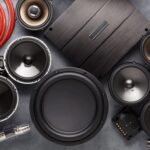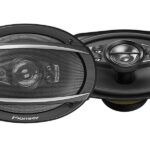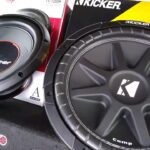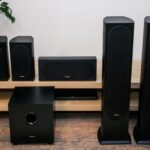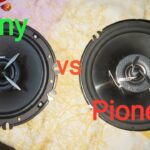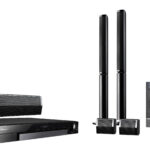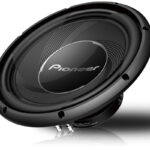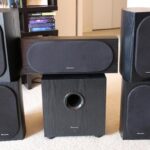Monoblock amps are compact, single-channel amplifiers used to power a single speaker or subwoofer. Monoblock amps provide high power output in a small form factor.
They are popular in car audio systems for their efficiency and ability to produce deep bass tones. Monoblock amps are a type of amplifier that are compact and used to power a single speaker or subwoofer. These amps are known for their high power output in a small size, making them a popular choice in car audio systems.
They are especially valued for their efficiency and ability to produce deep bass tones. Whether you are looking to upgrade your car’s sound system or enhance your home theater, understanding the features and benefits of monoblock amps can help you make an informed decision.
Understanding The Basics Of Monoblock Amps
A monoblock amp, also known as a monaural amplifier, is a type of audio amplifier that is designed to power a single speaker or subwoofer. It is called “mono” because it amplifies and reproduces a single-channel audio signal. These amps are popular among audiophiles and music enthusiasts for their ability to deliver high power output and precise sound reproduction.
The definition of monoblock amps is simple: they are amplifiers that are specifically engineered to amplify and enhance the audio performance of a single speaker or subwoofer. Unlike stereo amps that are designed to power multiple channels, monoblock amps focus all their power on a single output, which ensures maximum power delivery and reduced distortion. This makes them ideal for high-performance audio systems and car audio setups.
Utilizing a monoblock amp in an audio system offers several benefits. Firstly, the dedicated amplification of a single speaker or subwoofer ensures that every detail of the audio signal is accurately reproduced, resulting in enhanced clarity and precision. Additionally, monoblock amps have high power capabilities, providing ample headroom to handle dynamic peaks and low-frequency demands without distortion.
The key components of a monoblock amp include the power supply, input stage, output stage, and protection circuitry. The power supply converts the available power into a stable and regulated voltage that is necessary for amplification. The input stage amplifies the incoming audio signal and prepares it for further processing. The output stage delivers the amplified signal to the speaker or subwoofer. Lastly, the protection circuitry ensures the safety of the amp and connected devices by monitoring the voltage levels and temperature.
Advantages Of Monoblock Amps In Audio Systems
Monoblock amps offer several key advantages that enhance the audio experience in audio systems. Firstly, they are known for delivering improved audio quality and clarity. The singular channel configuration allows for better amplification, resulting in enhanced sound reproduction with more depth and detail.
Additionally, monoblock amps excel in efficient power distribution. With individual amplifiers dedicated to each speaker, the power is optimized and focused solely on the connected speakers. This ensures that each speaker receives the necessary power it requires without any compromise.
Furthermore, monoblock amps contribute to reduced interference and distortion. By having separate amplifiers for each speaker, the chances of crosstalk or interference between channels are minimized. This leads to a cleaner and purer sound output, free from unwanted noise or distortion.
| Advantages | Description |
|---|---|
| Improved Audio Quality and Clarity | The singular channel configuration allows for better sound reproduction with more depth and detail. |
| Efficient Power Distribution | Individual amplifiers dedicated to each speaker ensure optimal power delivery. |
| Reduced Interference and Distortion | Separate amplifiers minimize crosstalk and unwanted noise, resulting in cleaner sound. |
Factors To Consider When Choosing A Monoblock Amp
When choosing a monoblock amp, there are several factors to consider:
| Power output and impedance compatibility |
|---|
| It is important to make sure that the power output of the amp matches the requirements of your speakers. Additionally, check that the amp is compatible with the impedance of your speakers to ensure optimal performance. |
| Quality of internal components |
| Consider the quality of the internal components of the amp, such as the capacitors, resistors, and wiring. High-quality components can significantly impact the audio performance and reliability of the amp. |
| Size and space requirements |
| Take into account the size and space requirements of the monoblock amp. Ensure that it can fit in your desired location and that there is sufficient ventilation to prevent overheating. |
By considering these factors, you can choose a monoblock amp that is suitable for your audio system and provides optimal performance.
Installation And Setup Of Monoblock Amps In Audio Systems
Monoblock amps are an essential component in audio systems, providing power and enhancing sound quality. Proper installation and setup are crucial to ensure optimal performance. When choosing a location for installation, consider factors such as accessibility, ventilation, and proximity to the audio source. **Connect the monoblock amp** to the audio system using high-quality cables and ensure a secure connection. It is essential to **adjust the settings** of the monoblock amp to match the specifications of your audio system. This includes adjusting the gain, crossover frequency, and phase settings to achieve the best sound quality. **Experiment with the settings** to find the optimal configuration that suits your preferences. With the right installation and setup, monoblock amps can significantly enhance the audio experience, delivering powerful and precise sound reproduction.
Common Misconceptions About Monoblock Amps
Monoblock amps are often misunderstood, leading to several common misconceptions. One such myth is that monoblock amps are only suitable for high-end audio systems. However, this is not true. Monoblock amps can enhance the audio quality of any sound system, regardless of its size or price range.
Another misconception is that monoblock amps require complex wiring and setup. On the contrary, setting up a monoblock amp is relatively straightforward. It typically involves connecting the amp to the audio source and speakers, making it accessible for anyone, even those without extensive knowledge of audio equipment.
Additionally, some people believe that monoblock amps are unnecessary for small audio setups. However, this is not accurate. Regardless of the size of your audio system, a monoblock amp can provide improved power efficiency and better overall performance, resulting in enhanced audio quality.
Therefore, it’s important to dispel these misconceptions and recognize the versatility and benefits that monoblock amps bring to any audio setup, whether it’s a high-end system or a small setup.
Best Practices For Maintaining And Troubleshooting Monoblock Amps
Regular cleaning and maintenance routines are essential for maintaining the optimal performance of your monoblock amps. Ensure to keep the exterior clean by wiping it regularly with a damp cloth. Use compressed air to remove dust and debris from the ventilation holes. Pay attention to the connections and cables, ensuring they are securely connected and free from any signs of corrosion or damage.
When troubleshooting common issues with monoblock amps, start by checking the power source and cable connections. Inspect the fuse and replace if necessary. Test different audio sources and speakers to identify any potential issues. If you experience any distortion or noise, check the input and output levels and adjust accordingly. Consider seeking professional help or consulting the manufacturer’s troubleshooting guide for more advanced or specific issues.
Remember, regular maintenance and troubleshooting can prolong the lifespan of your monoblock amps and ensure optimal audio performance. By following these best practices, you can maintain and troubleshoot your monoblock amps effectively.
Real-World Applications And Success Stories Of Monoblock Amps
Monoblock amps, also known as monoblocks, are single-channel amplifiers that offer a range of benefits in various real-world applications. Whether it’s enhancing the audio experience in a home theater, revolutionizing recording studios, or improving car audio systems, monoblock amps have proven to be a game-changer.
Case study 1: Imagine a home theater where every sound, from a gentle whisper to an explosive action sequence, feels immersive and crystal clear. That’s exactly what a monoblock amp can deliver. By providing dedicated power to each speaker, monoblock amps eliminate the possibility of interference and ensure an unmatched audio experience.
Case study 2: Professional recording studios demand exceptional sound quality and precision. Monoblock amps offer the perfect solution, with their ability to deliver consistent power to studio monitors. This results in accurate sound reproduction and a dynamic range that captures the artist’s intention flawlessly.
Case study 3: Car enthusiasts who seek superior audio clarity and power turn to monoblock amps for their car audio systems. With their compact design and efficient power delivery, monoblock amps optimize the performance of subwoofers and speakers, taking in-car audio to a whole new level.
Conclusion
To wrap up, monoblock amps are compact, powerful, and efficient amplifiers that are designed to provide excellent audio performance. With their single-channel configuration, they offer improved stability and power to drive even the most demanding speakers. Whether you are a professional musician or an audio enthusiast, investing in a monoblock amp will surely enhance your audio experience and bring out the best in your audio system.
Frequently Asked Questions Of What Are Monoblock Amps
What Are Monoblock Amps Used For?
Monoblock amps, also known as monoblocks, are used to power a single channel in a car audio system. They are specifically designed to provide high power output for subwoofers, delivering clear and powerful bass. Monoblock amps are popular among car audio enthusiasts for their ability to enhance the low-frequency performance of a sound system.
How Do Monoblock Amps Differ From Other Amplifiers?
Unlike stereo amplifiers that can power multiple channels, monoblock amps are designed to power a single channel. This allows them to provide more power and better control to that specific channel, especially when it comes to driving subwoofers. Monoblock amps are more efficient and are optimized for delivering powerful bass performance.
What Are The Advantages Of Using Monoblock Amps?
Using monoblock amps has several advantages. Firstly, they offer higher power output compared to other amplifier types, ensuring loud and clear bass. Secondly, they have better thermal stability, preventing overheating issues commonly faced by multi-channel amps. Lastly, monoblock amps are compact in size, making installation easier and more flexible in tight spaces.
Are Monoblock Amps Compatible With All Car Audio Systems?
Yes, monoblock amps are compatible with all car audio systems. They can be used with factory-installed stereos or aftermarket head units. Monoblock amps are versatile and can work with various speaker configurations and subwoofers. They provide an easy and efficient way to upgrade your car’s audio system, regardless of the setup you have.
